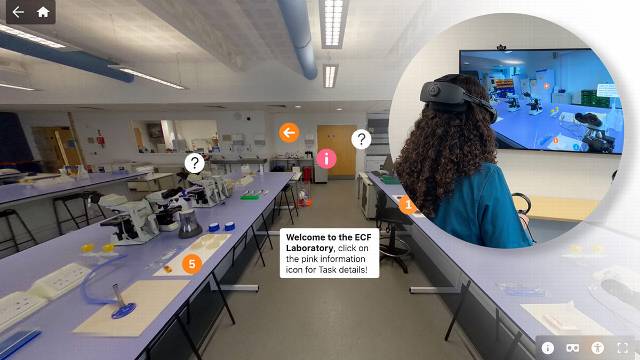
Professor Frank Vriesekoop is a contender for the Harper staff member with the most varied portfolio. He’s Associate Head of the Food Technology and Innovation department, teaches food science modules, is Chair of the Research Ethics Committee and visiting professor at HAS University of Applied Sciences in the Netherlands.
The latter role could well prove to be pivotal in shaping Harper’s connections to Europe in coming years. Frank, who previously spent seven years working in Australia, specialising in brewing and distilling, said: “I’m embedded into the HAS Department of Food Technology. The idea is to build bridges between departments and the university as a whole.
“We’re looking for anything where we can work together: staff interchanges, opportunities for their students to come here for masters as part of a module or internships. The on-campus R&D section of Dairy Crest also takes a number of HAS internships, and I facilitate the paperwork as part of the HAU-Dairy Crest partnership. The ultimate goal of this is establishing fruitful interactions between the HAS and Harper Adams.”
The research projects Frank is currently involved in are almost as varied as his responsibilities. This includes biotechnology projects in collaboration with various institutions in China, food-industry waste valorisation, and research looking at consumer perception of alternative dietary proteins across a large number of different countries.
“I support student and staff projects at Beijing Polytechnic and the Beijing University of Chemical technology. One project nearing completion is about ways of delivering active compounds commonly associated with food to get into cancer cells. Then there’s work looking at nano application of ingredients. For example, rosemary contains highly anti-oxidative compounds and is antimicrobial but not soluble in water, so not compatible with most foods. To get the benefits you would need to add so much that the entire product would taste of rosemary, however nanotechnology reduces the amount needed, whereby it doesn’t reduce its efficiency or influence the flavour of food. It’s about getting function but not taste, in a stable form,” he says.
Taste is just one aspect of work exploring alternative protein sources, which include cultured meat and insects. This is a project where partners in Spain and the Dominican Republic are currently taking the initiative.
“There’s real interest in what people are thinking at the moment about alternative proteins and what is triggering people eating less meat. There’s lots of confusion about it, too. The research is in different cultures with different agricultural sectors – some that are meat producers and some that are more consumers. Dominican Republic is an interesting example as a developing nation. When people become richer they want the same products as developed countries - a steak on the table for example, and to eat less plant-based proteins. There’s that association with affluence.”
On top of the studies he’s personally involved with, Frank is also supervising some intriguing Honours Research Projects on subjects as diverse as hygiene of smart phones, non-alcoholic spirits and the ‘flexitarian’ lifestyle.
Last but certainly not least, overseeing research ethics provides a different sort of focus altogether. “We have a responsibility to make sure research doesn’t overstep boundaries of welfare, privacy and safety with regards to the researcher and the research participants.
“I’ve been doing it for five years, and the amount of ethics applications has doubled in that time. I do think that with enough preparation and common sense, almost any project could be carried out – but we need to point out where the boundaries are. If those are pushed too far, we ask if there is there a slightly different way of achieving what you’re trying to achieve.”
 Blog: Veterinary Medicine students step into immersive 360° laboratory
At Harper & Keele Veterinary School, students are stepping beyond the traditional microbiology bench and into an immersive 360° labo …
Posted
Yesterday
Blog: Veterinary Medicine students step into immersive 360° laboratory
At Harper & Keele Veterinary School, students are stepping beyond the traditional microbiology bench and into an immersive 360° labo …
Posted
Yesterday




